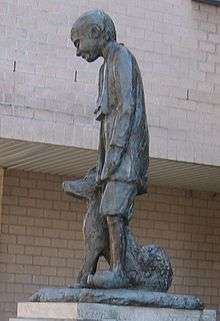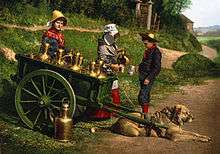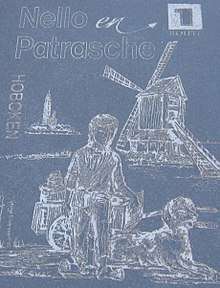A Dog of Flanders
A Dog of Flanders is an 1872 novel by English author Marie Louise de la Ramée published with her pseudonym "Ouida". It is about a Flemish boy named Nello and his dog, Patrasche and is set in Antwerp.
 | |
| Author | Marie Louise de la Ramée |
|---|---|
| Country | United Kingdom |
| Language | English |
| Genre | Drama, Tragedy |
| Published | 1872 (Chapman and Hall) |
| Media type | Print (Hardcover) |
| Pages | 80 pp |
In Japan, Korea and the Philippines, the novel has been an extremely popular children's classic for decades and has been adapted into several Japanese films and anime.[1] Since the 1980s, the Belgian board of tourism caught on to the phenomenon and built two monuments honoring the story to please East-Asian tourists. There is a small statue of Nello and Patrasche at the Kapelstraat in the Antwerp suburb of Hoboken, and a commemorative plaque in front of the Antwerp Cathedral donated by Toyota,[1] that was later replaced by a marble statue of the two characters covered by a cobblestone blanket, created by the artist Batist Vermeulen.
Summary

In 19th century Belgium, a boy named Nello becomes an orphan at the age of two when his mother dies in the Ardennes. His grandfather Jehan Daas, who lives in a small village near the city of Antwerp, takes him in.
One day, Nello and Jehan Daas find a dog who was almost beaten to death, and name him Patrasche. Due to the good care of Jehan Daas, the dog recovers, and from then on, Nello and Patrasche are inseparable. Since they are very poor, Nello has to help his grandfather by selling milk as the unnamed crooked landlord demands rent money from them. Patrasche helps Nello pull their cart into town each morning.
Nello falls in love with Aloise, the daughter of Nicholas Cogez, a well-off man in the village, but Nicholas doesn't want his daughter to have a poor sweetheart. Although Nello is illiterate, he is very talented in drawing. He enters a junior drawing contest in Antwerp, hoping to win the first prize, 200 francs per year. However, the jury selects somebody else.
Afterwards, a fire occurred on Nicholas property. The landlord stated Nello was responsible to shift the blame of his neglect as Nicholas tells Nello to stay away from Aloise. Later on, his grandfather dies and the landlord evicts him and Patrasche. His life becomes even more desperate.
Having no place to stay, Nello wishes to go to the cathedral of Antwerp (to see Rubens' The Elevation of the Cross and The Descent of the Cross), but the exhibition held inside the building is only for paying customers and he's out of money. On the night of Christmas Eve, he and Patrasche go to Antwerp and, by chance, find the door to the church open. The next morning, the boy and his dog are found frozen to death in front of the triptych.
Popularity
The novel shares a reasonable notability in both the United Kingdom and the United States and is extremely popular in Japan, Korea and the Philippines to the point where it is seen as a children's classic. It inspired film and anime adaptations, including the 1975 animated TV series Dog of Flanders which reached an audience of 30 million viewers on its first broadcast.[2]
In Belgium, the story is more obscure. Only in 1987 did it receive a Dutch translation; this happened after the tale was adapted into a story of the popular comic book series Suske en Wiske. Since then, monuments were raised to commemorate Nello and Patrasche to please tourists. In 2007 Didier Volckaert and An van Dienderen directed a documentary about the international popularity of the story: "Patrasche, A Dog of Flanders - Made in Japan". It researches all available film adaptations of the story and interviews several British, American and Japanese people about what attracts them to this novel.[2]
Film, TV and theatrical adaptations

The novel has been adapted for cinema and television in live-action and animation. None of the film versions, excluding the 1997 Japanese movie and Snow Prince (2009), uses the novel's ending and have preferred to substitute a more optimistic one:
- A Dog of Flanders (1914),[3] a short film directed by Howell Hansel
- A Boy of Flanders (1924),[4] directed by Victor Schertzinger and starring Jackie Coogan as Nello
- A Dog of Flanders (1935),[5] directed by Edward Sloman
- A Dog of Flanders (1959),[6] directed by James B. Clark and starring David Ladd as Nello.
- Dog of Flanders (1975), a Japanese animation TV series produced by Nippon Animation
- My Patrasche (1992), a Japanese animation TV series produced by Tokyo Movie Shinsha
- The Dog of Flanders (Japan, 1997),[7] a remake of the 1975 TV series directed by Yoshio Kuroda. In this version, Aloise reflects on the life of Nello while working as a nun and the landlord is named Hans.
- A Dog of Flanders (1999),[8] directed by Kevin Brodie. In this version, the landlord is named Stevens and the ending reveals that the character Michel La Grande is Nello's long-lost father.
- Barking Dogs Never Bite (2000), a South Korean satirical version directed by Bong Joon-ho
- Snow Prince (Japan, 2009), directed by Joji Matsuoka.[9] (in Japanese) At the end of this film, the boy and the dog are found frozen to death under a tree.
- A Dog of Flanders, 2011, Minoto Studios
For its authentic 19th century buildings, the Open Air Museum of Bokrijk, Flanders was used as scenery for the 1975 and 1992 anime and the 1999 film.
In one of the film versions, Nello and his dog go to the village church, where the pastor covers them with a woolen blanket, thus saving their lives. Two days later, one of the judges comes. Because he thought Nello was the true winner, he asks him to stay with him. As years pass, Patrasche dies and Nello becomes a famous artist.
Documentary film
- Patrasche, a Dog of Flanders - Made in Japan (2007), a documentary film directed by Didier Volckaert and An van Dienderen.[10]
Comic book version
The story was used as a plot device in the Suske en Wiske comic book series, namely the album Het Dreigende Dinges (The Threatening Thing) (1985). The album was translated into Japanese.[11][2]
Monument
There are three monuments built to commemorate the story. The first one was built in 1985 and can be seen in the Kapelstraat in Hoboken, Antwerp.[12] Up until the end of 2016 a fictional grave stone stood near the Antwerp Cathedral. It had text in English and Japanese that read: "Nello, and his dog Patrasche, main characters from the story "A Dog of Flanders", symbols of true and sternful friendship, loyalty and devotion."[13]
On December 10, 2016, a new monument was revealed on the Handschoenmarkt square in front of the Antwerp Cathedral. A sculpture in white marble represents Nello and Patrasche sleeping, covered by a blanket of cobble stones. The sculpture is made by Belgian artist Batist Vermeulen (Tist).[14]
Location
In 1985 an employee of Antwerp tourism, Jan Corteel, wanted to promote "A Dog of Flanders". He presumed the village of the story to be Hoboken, even though this is never mentioned in the story itself. Ouida is believed to have visited Antwerp for four hours, and spoke of having seen a village near a canal, not far from a windmill. This vague explanation was used to claim the story took place in Hoboken, but other people contest this.[15]
Additional Information
Similar stories:
- The Little Match Girl (1845)
- Black Beauty (1877)
- Hachi: A Dog's Tale (2009)
- Ciccio,[16] from Italy
References
- "Nello and Patrasche – the Antwerp's story of the Dog of Flanders". Beneluxguide.com. Retrieved 30 November 2016.
- "ARGOS centre for art and media". Argosarts.org. Retrieved 30 November 2016.
- "A Dog of Flanders" – via www.imdb.com.
- "A Boy of Flanders" – via www.imdb.com.
- "A Dog of Flanders" – via www.imdb.com.
- "A Dog of Flanders" – via www.imdb.com.
- "The Dog of Flanders" – via www.imdb.com.
- "A Dog of Flanders" – via www.imdb.com.
- Matsuoka, Joji (2009). Snow Prince. Japan. Archived from the original on 30 December 2009.
- Volckaert, Didier & van Dienderen, An (2007). Patrasche, a Dog of Flanders - Made in Japan. Belgium.
- "Het dreigende dinges - Suske en Wiske no. 201". Suskeenwiske.ophetwww.net. Retrieved 30 November 2016.
- Cloetens, Brecht. "Yvonne Bastiaens - Nello en Patrasche". Standbeelden.be. Archived from the original on 28 October 2017. Retrieved 18 November 2017.
- "ACE Animal Care España - Nello and Patrasche". Ace-charity.org. Archived from the original on 29 March 2016. Retrieved 30 November 2016.
- "Zo zal het nieuwe standbeeld van Nello en Patrasche op de Handschoenmarkt er uit zien". Gva.be. Retrieved 30 November 2016.
- "Foute hond, fout district". Gva.be. Retrieved 30 November 2016.
- "Dogbook on Facebook". archive.is. 16 February 2013. Archived from the original on 16 February 2013.
Further reading
- "Do you know "A Dog of Flanders"?". Crossroads. 2006. Archived from the original on 22 June 2006. Retrieved 6 June 2006.
External links
| Wikisource has original text related to this article: |

- Project Gutenberg eBook